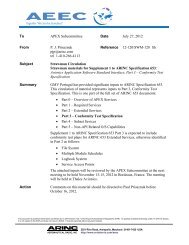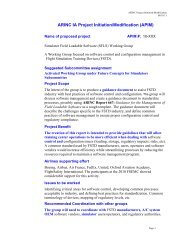(AGIE) Using Internet Protocols - Aviation Committees - AEEC - AMC
(AGIE) Using Internet Protocols - Aviation Committees - AEEC - AMC
(AGIE) Using Internet Protocols - Aviation Committees - AEEC - AMC
- No tags were found...
You also want an ePaper? Increase the reach of your titles
YUMPU automatically turns print PDFs into web optimized ePapers that Google loves.
4.0 <strong>AGIE</strong> FUNCTIONAL SPECIFICATIONARINC PROJECT PAPER 830 – Page 413. Manage time-to-live by standard default, which the admin may override, bymessage type.4. Automatic message deletion after delivery and/or timeout. Originator mayrequest message deletion or request status any time after the message issent (until the message expires).5. Message persistence, which is default to NO-CHECKPOINT, where theoriginator may request persistence to check point it when possible byservers with access to persistent store. This allows very important messagesto reduce the likelihood of being lost and unrecoverable.COMMENTARYIt is not a requirement (except logging) for any data to be consideredpersistent. This is a request, which may or may not be honored by any <strong>AGIE</strong>node handling the message based on the node’s AMQP durabilitycapabilities and settings.What happens when a message times out is left to implementation (other thandefined logging, reporting, and deletion). The implementation may simply delete themessage, query the application, or process the message in some other way for resubmission.The minimum or default is to simply delete the message and ifreporting, status, or logging is requested, follow that line of response.<strong>AGIE</strong> provides for message persistence using AMQP durability settings. Not all<strong>AGIE</strong> servers or AMQP brokers will have access to persistent storage. <strong>AGIE</strong>persistence is managed in the XML templates via a standard message field called“Checkpoint” that when set, requests the message be check pointed any time thedestination is not immediately reachable. This is important for critical logging events,such as security events. One task of association is reporting status of storedmessages, which include check pointed messages not yet delivered as well asmessage segments received but not completed.<strong>AGIE</strong> shall provide logging function that provides logged events to an external logfunction via Log Client. <strong>AGIE</strong> does not define what happens to these logged eventsoutside of <strong>AGIE</strong>.4.4.3 Message Service ConsiderationsEach messaging service has unique considerations.4.4.3.1 Immediate MessagingImmediate messaging is a service defined to provide real-time like capabilitieswithout adding strict real-time requirements to <strong>AGIE</strong>. This service is defined simplyas a high priority message with an immediate (zero) “time-to-live.” Immediatemessages have the guarantee of real-time response to success or failure. Thissupports applications such as chat-like services and low latency aviation messages,where it is important to either have a real-time <strong>AGIE</strong> service or real-time (immediate)response, be it positive or negative. <strong>AGIE</strong> shall provide immediate messagingservice. <strong>AGIE</strong> implementation shall include provisions that are aimed at minimizinglatency when processing for immediate messaging.










